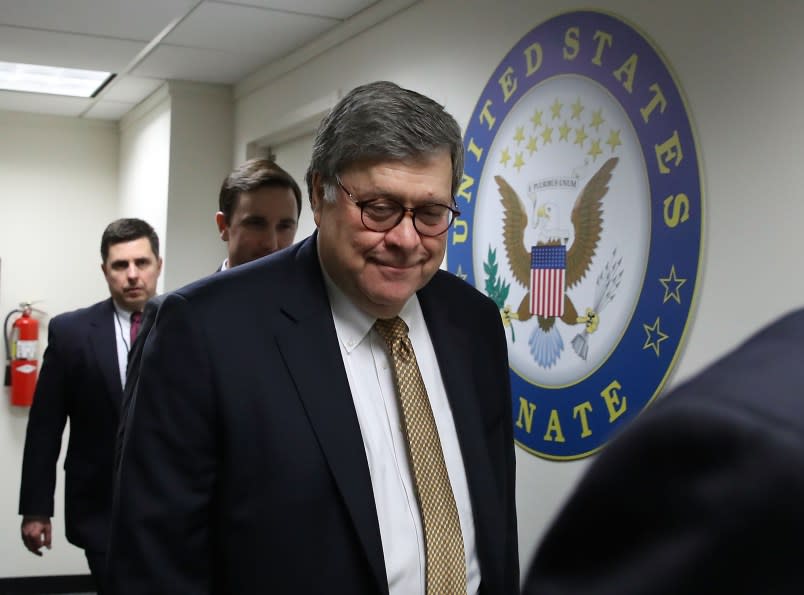Barr’s ‘Highly Unusual’ Involvement in Roger Stone Sentencing Remains Murky

- Oops!Something went wrong.Please try again later.
A new DOJ Inspector General report on a bizarre 2020 episode in which the Trump DOJ retracted its sentencing recommendation for Trump impresario Roger Stone reveals in part how much senior officials from that era don’t want to discuss it.
In February 2020, federal prosecutors asked a judge to sentence the longtime Trump ally to between seven and nine years in prison for obstruction, false statements, and witness tampering charges in the Mueller investigation. But after Trump tweeted angry complaints, prosecutors took the virtually unprecedented step of criticizing themselves and backtracking on what they had asked for: the earlier sentence recommendation was “excessive and unwarranted,” prosecutors said, and they would defer to the judge without making a recommendation.
The episode was seen as potentially one of the clearest instances of political interference and overreach by the Trump DOJ, with senior department leadership overruling the recommendation put forth by the line prosecutors who worked on the case. The main beneficiary of the change was Stone, a veteran Republican political operative who worked closely with Trump to help him win the 2016 presidential election.
Per the OIG report released on Wednesday, the watchdog concluded that the involvement of Attorney General Bill Barr and other senior DOJ leader in the case was “highly unusual.” Then-interim U.S. Attorney for the District of Columbia Timothy Shea exhibited “ineffectual leadership,” the report found, fighting words from the inspector general.
But the report fell short of substantiating the allegation that Trump asked for Barr to intervene. It found that Barr had “articulated his position” about what the sentencing recommendation should be before Trump tweeted and before the initial recommendation was filed.
It’s not entirely clear how far the inspector general was able to go outside of certain DOJ officials and whatever records were preserved and identified by the investigation. Barr, the watchdog said, refused to sit for an an interview. Other senior DOJ officials, including then-Deputy Attorney General Jeffrey Rosen, the then-DOJ public affairs director, and one of the line prosecutors also refused interviews. The report does not say if any effort was made to contact Trump.
With all of that in mind, the OIG said that the investigation found no “documentary or testimonial evidence” of “improper political considerations or influence” in the sentencing recommendations.
What’s left is a story of miscommunication that at least partly elides the still-lingering questions of corrupt political influence and encroachment on DOJ independence.
Shea, the report found, met with Barr before the initial sentencing recommendation was filed on the day that it was due before the court. The two spoke about the filing – already out of the ordinary for an attorney general – and Barr said that he thought the result dictated by the sentencing guidelines was “high, disproportionate,” and “inflated.”
From there, Shea purportedly told Barr that line prosecutors on the Stone case could resign depending on what sentence they were instructed to make to the court by their superiors.
“It was going to be a publicity thing,” Shea told Barr, per the report.
At that point, the report says, Shea had a gap in his memory: He recalled saying that line prosecutors might resign, but did not remember how Barr reacted to that possibility.
Instead, Shea recalled, Barr said that they should “defer to the court.” In essence, that would mean prosecutors would not make a sentencing recommendation to the judge.
Shea then told investigators a few illuminating things about what he believed Barr had said. Per the report, Shea walked away from the conversation thinking both that Barr had merely expressed his own “belief” and had not given him a direction; at the same time, Shea told investigators, he was “sure” that Barr believed that Shea would nevertheless defer to the court.
Per another witness, Barr’s then-Chief of Staff Brian Rabbit, Shea in fact told Barr that he would ask line prosecutors if they could ask for a shorter sentence and defer to the court – an offer that Barr purportedly accepted. Barr himself later told the House Judiciary Committee that he believed he decided at the meeting to defer to the judge.
Regardless of the specifics of what took place, the diverging accounts point to the same reality: Senior political leadership at DOJ was, the report says, doing something “highly unusual.” The attorney general had chosen to “personally participate” in a decision typically left to line prosecutors, in this case involving the sentencing of a close ally of the President.
After prosecutors filed a sentencing recommendation that went against Barr’s request in favor of what the sentencing guidelines dictated, Trump began to tweet. He called the sentence “disgraceful!” and a “horrible and very unfair situation.”
The next day, Barr held a meeting with senior leadership at which he expressed surprise and frustration. At one point, someone brought up Trump’s tweets, and “the air almost went out of the room.”
Officials discussed whether asking for a lower sentence would be seen as coming in response to Trump’s tweets, but any attempt at moderation was “flatly rejected,” per the report.
It’s a bizarre situation: Barr, handpicked by Trump to be attorney general largely because of his opposition to the Mueller investigation, had pushed for a lower sentence for a close ally of Trump’s out of a belief that the underlying charges were not as serious as prosecutors believed. When Barr moved to override prosecutors’ decision, that was ignored, prompting angry, public statements from Trump, thereby making it more difficult for Barr to accomplish what he initially intended: asking a judge to give a Trump ally a lighter sentence.
Weeks later, Barr told ABC that Trump needed to stop tweeting.
“I cannot do my job here at the department with a constant background commentary that undercuts me,” he said.

